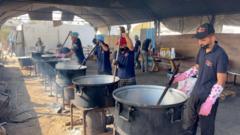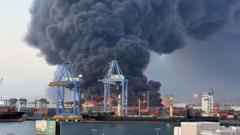In the heart of Khan Younis, the community kitchens run by the American Near East Refugee Aid (Anera) serve as a lifeline for the impoverished population of the Gaza Strip, currently grappling with severe food scarcity. The kitchens, which normally prepare meals with protein-rich ingredients, are now forced to deliver rations consisting primarily of lentils and rice, as fresh produce and meat are no longer accessible.
Gaza's Community Kitchens Face Critical Food Shortage Amid Ongoing Blockade

Gaza's Community Kitchens Face Critical Food Shortage Amid Ongoing Blockade
A humanitarian crisis unfolds in Gaza as community kitchens warn of imminent food shortages after two months of an Israeli blockade.
Sami Matar, who oversees the operations, emphasized the dire situation. “People depend on us; they have no money to buy what's left in local markets,” he stated. Reports indicate that the UN's World Food Program and Palestinian refugee agencies have exhausted their food stocks, compoundingly intensifying the risk of mass starvation in the region.
Pressure mounts internationally for Israel to ease the blockade, described by UN officials as a form of collective punishment against civilians. The humanitarian chief warned that restricting aid equates to violating the fundamental rights of the people. As of now, hundreds of thousands depend on the community kitchens for vital sustenance, and without intervention, those kitchens could soon become empty.
Anera's primary kitchen, which currently serves 6,000 individuals daily, has less than two weeks of food supplies left. “We used to receive over 100 trucks of food each week; now we have nothing,” Matar lamented. The ongoing conflict has left Gaza’s health outcomes teetering on the brink, with extreme malnutrition reports soaring among children.
As workers prepare meals, elderly and displaced families queue for parcels that hold their only hope for a square meal. An elderly man, grateful for a few servings of koshari, expressed despair, stating, "We're only alive because death hasn't taken us yet." Another mother lamented chronic shortages, stating, “Life is humiliating here, and we cannot buy anything.”
With the ongoing humanitarian crisis catalyzed by the blockade and disrupted aid, community kitchens face an uncertain future. Matar's appeal to Israel to reopen crossings marks a desperate call for action amid a backdrop of continued conflict, as the world observes the deteriorating living conditions of Gaza’s inhabitants.
Pressure mounts internationally for Israel to ease the blockade, described by UN officials as a form of collective punishment against civilians. The humanitarian chief warned that restricting aid equates to violating the fundamental rights of the people. As of now, hundreds of thousands depend on the community kitchens for vital sustenance, and without intervention, those kitchens could soon become empty.
Anera's primary kitchen, which currently serves 6,000 individuals daily, has less than two weeks of food supplies left. “We used to receive over 100 trucks of food each week; now we have nothing,” Matar lamented. The ongoing conflict has left Gaza’s health outcomes teetering on the brink, with extreme malnutrition reports soaring among children.
As workers prepare meals, elderly and displaced families queue for parcels that hold their only hope for a square meal. An elderly man, grateful for a few servings of koshari, expressed despair, stating, "We're only alive because death hasn't taken us yet." Another mother lamented chronic shortages, stating, “Life is humiliating here, and we cannot buy anything.”
With the ongoing humanitarian crisis catalyzed by the blockade and disrupted aid, community kitchens face an uncertain future. Matar's appeal to Israel to reopen crossings marks a desperate call for action amid a backdrop of continued conflict, as the world observes the deteriorating living conditions of Gaza’s inhabitants.




















